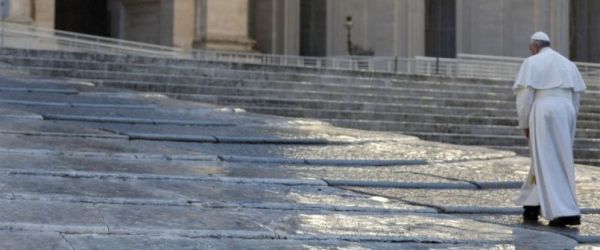Salvation "cannot be bought or sold" because "it is a totally free gift". But to receive it God asks us to have "a humble, docile, obedient heart". Pope Francis said this in the Mass celebrated on Tuesday morning 25 March in the chapel of the Casa Santa Marta, inviting "to celebrate and give thanks to God" because "today we commemorate a definitive stage in the journey" towards salvation "that man has made since the day he came out of paradise".
It is precisely "for this reason that today we celebrate: the celebration of this journey from a mother to another mother, from a father to another father", the Pontiff explained. And he invited us to contemplate "the icon of Eve and Adam, the icon of Mary and Jesus", and to look at the course of history with God who always walks with his people. Thus, he continued, "today we can embrace the Father who, thanks to the blood of his Son, became one of us, and saves us: this Father who awaits us every day". Hence the invitation to say "thank you: thank you, Lord, because today you say to us that you have given us salvation".
In his reflection, the Pontiff started from the mandate given to Adam and Eve: the commitment to work and dominate the earth, and to be fruitful. 'It is the promise of redemption,' he explained, 'and with this commandment, with this promise, they began to walk, to make a way'. A "long road", made up of "many centuries", but which began "with disobedience". Adam and Eve in fact "were deceived, they were seduced. They have been seduced by Satan: you will be like God!". Pride and pride" prevailed in them, so much so that "they fell into the temptation: to take the place of God, with pride enough". It is precisely "that attitude that only Satan has totally in him".
Adam and Eve "made a people". And "they did not make this journey alone: the Lord was with them", who accompanied humanity along an itinerary "that began with disobedience and ended with obedience". To explain this, Pope Francis recalled, "the Second Vatican Council takes a beautiful phrase from St Irenaeus of Lyons that says: the knot that Eve made with her disobedience Mary untied with her obedience". Moreover, he added, the Church also explains this path with a prayer that reads: "Lord, you who wonderfully created humanity and restored it, restored it more wonderfully...". It is therefore "a path where the wonders of God are multiplied, they are more!".
God therefore always remains "with his people on their journey: he sends prophets and he sends people to explain the law". But "why," the Pontiff wondered, "did the Lord walk with his people with such tenderness? To soften our hearts' is the answer. And indeed Scripture explicitly reminds us of this: I will make your heart of stone a heart of flesh.
In essence, the Lord wants to "soften our hearts" so that they can receive "that promise that he had made in paradise: for one man sin entered, for another man salvation comes". And it is precisely this 'long journey' that has helped 'all of us to have a more human heart, closer to God; not so proud, not so sufficient'.
"Today," the Pope explained, "the liturgy speaks to us of this journey of restoration, of this stage in the journey of restoration. And it speaks to us of obedience, of docility to the word of God'. A thought, the Pontiff pointed out, that "is very clear" in the second reading, taken from the letter to the Hebrews (10:4-10): "Brothers, it is impossible for the blood of bulls and goats to eliminate sins".
Hence the statement that "salvation is not bought, it is not sold. It is given, it is free'. And since 'we cannot save ourselves from ourselves, salvation is a gift, totally free. As St Paul writes, it cannot be bought with 'the blood of bulls and goats'. And if 'it cannot be bought', to 'enter into us this salvation demands a humble heart, a docile heart, an obedient heart, like that of Mary'. Thus "the model of this path of salvation is God himself, his Son, who did not esteem it an irrenounceable good to be equal to God - Paul says so - but annihilated himself and obeyed even unto death and death on a cross".
What then does 'the path of humility, of humiliation' mean? It simply means, Pope Francis concluded, 'to say: I am man, I am woman, and you are God! And to go before, in the presence of God, as a man, as a woman in obedience and docility of heart".
[Pope Francis, S. Marta homily, in L'Osservatore Romano 26/03/2014]












